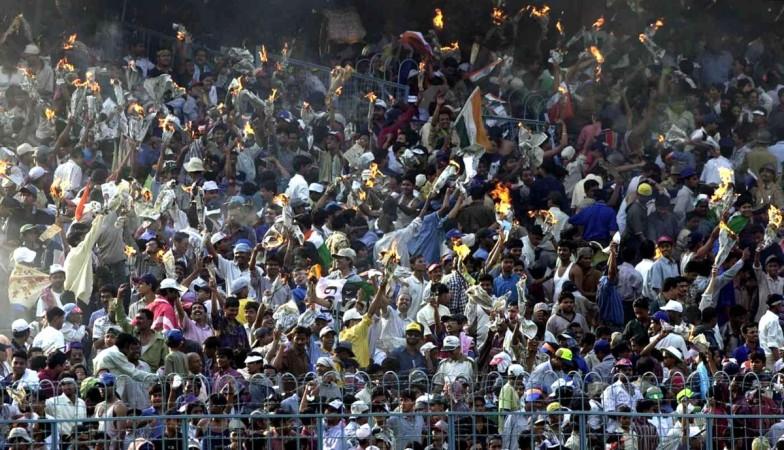When VVS Laxman edged a short and wide delivery from Glenn McGrath early on the fifth morning, India was playing no more to save the Test match, but amid a serious counter-attack to win it. And the roar he got while heading back to the dressing room – not even Hyderabad, his hometown, could have reproduced its raw emotion and unbridled passion.
Fifteen Test wins in a row, Steve Waugh's Australia came to their self-proclaimed 'Final Frontier' and added a sixteenth but in Kolkata, they fell – the Aussies would stand, without answer, and witness India change the face of world cricket in front of over 100,000 people at the Eden Gardens.
Australia may have been the biggest bully of the sport, but not on India's turf under Sourav Ganguly's watch.

Following a 10-wicket drubbing in Mumbai, no home captain would, in their right mind, come out late for a toss. Kolkata, however, was Ganguly's ground and here time starts when he puts on his watch. Waugh found that out on the first morning at Eden Gardens.
But India's fortune hardly changed as Australia piled on India's misery by scoring 445 runs in their first innings and by the afternoon of day 2, India was 8 down with only 113 on the board. The home side could only muster 58 more runs and all out for 171, Steve Waugh enforced the follow-on – the 'Final Frontier' was only a batting collapse away from falling.
The collapse did not come, instead, Laxman handed the Australians a batting master class and Rahul Dravid provided able support in guarding India's fort. On a pitch that was turning square, Laxman was stepping down to Shane Warne and whipping him – against the spin – to the mid-wicket boundary. When Warne tried to deceive Laxman in flight, he was being pulled off the back foot. Arguably the greatest bowler in the game's illustrious history was left clueless on a day 4 pitch that was aiding his skills.
After adding 376 runs for the fifth wicket, Laxman departed for 281 while Dravid ran himself out on 180. Well into day 5 India declared their innings on 657, setting Australia a target of 384 and achieving that target looked more likely than an Indian victory with a little over two sessions to play.

At tea, Australia was only three down and Steve Waugh had told his opposition captain that he had dropped the match by dropping his catch at leg slip. But Waugh was lured into his own trap of gamesmanship as he repeated his mistake and this time he had no reprieve. Australia was 166-4 and so engrossing was the contest, even Dravid joined the verbal bandwagon giving the Aussie skipper a send-off.
The procession started hence and within five overs, the best team in the world was eight down – Mark Waugh, Ricky Ponting and Adam Gilchrist all departed on nought. The Indian spinners had strangled the opposition and Harbhajan Singh was well on his way to immortality – a hattrick in the first innings and already a fifer in the second.
By this time, the police had let everyone, with and without tickets, into the stadium and everyone inside had prima facie evidence of Sachin Tendulkar trapping his great adversary, Warne plumb in front with a googly. The great Shane Warne could not pick a googly – the writing was on the proverbial wall.
After little resistance from the Aussie middle order, the tail tried to fight. But at 212-9, McGrath fell to the dreaded finger of umpire Shyam Bansal who gave his fifth LBW decision of day in India's favour and every Indian player erupted in unison.

In the aisles of the Eden Gardens, every placard, poster and piece of paper was on fire. The scenes could be likened to the bull-rings of old, where gladiators fought each other to death. Only this time, there were no deaths, but several rebirths – VVS Laxman had batted for nearly 11 hours, Dravid for seven and a half; Harbhajan had picked 13 wickets. And India had beaten Australia after being asked to follow-on in a feat that happened only twice before in the history of the game.
To put into context the impact of this victory on society, here's a story umpire Bansal later narrated. On the evening of the match when he was returning to his hotel, his car entered a no-entry zone and a police constable rightly stopped the vehicle. The man driving the car sheepishly asked Bansal to intervene. Once he stepped out, the constable asked, 'Were you the man who gave McGrath out?' and Bansal nodded in approval.
The constable replied, 'Today there are no no-entries for you in Kolkata!'









!['Had denied Housefull franchise as they wanted me to wear a bikini': Tia Bajpai on turning down bold scripts [Exclusive]](https://data1.ibtimes.co.in/en/full/806605/had-denied-housefull-franchise-they-wanted-me-wear-bikini-tia-bajpai-turning-down-bold.png?w=220&h=138)



